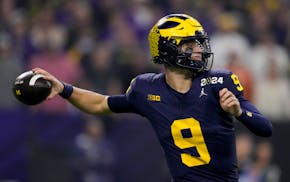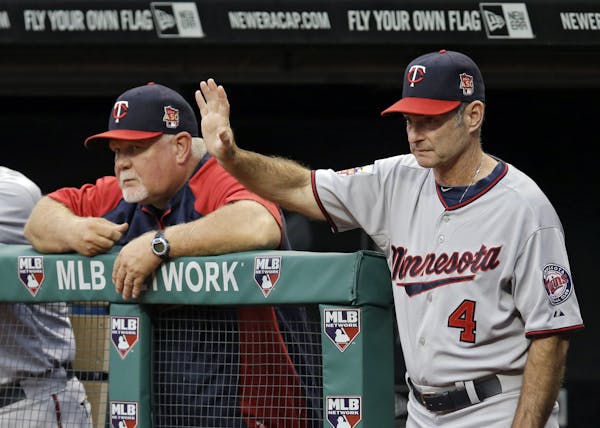If Paul Molitor convinces Terry Ryan that he should become the Twins' next manager, he will have overcome a significant barrier that keeps many candidates from winning jobs.
No, not his age. At 58, though he is more than a year older than Ron Gardenhire, there are five managers older than Molitor in the major leagues. No, not his inexperience. The Cardinals' Mike Matheny and Detroit's Brad Ausmus have their teams in the playoffs, and neither had managed at any level before being hired.
No, the obstacle Molitor faces has plenty of history behind it, yet still seems counterintuitive:
He was once great at baseball.
Molitor — the St. Paul native who was inducted into baseball's Hall of Fame a decade ago — interviewed with Ryan and Rob Antony, the Twins' top two baseball executives, Wednesday.
"I had a good meeting with Terry and Rob," Molitor said, "to discuss the managerial opening," though he declined to offer any details. Ryan also confirmed the meeting, describing it only as "the usual interview process. There's no sense in me getting deeper than that."
Ryan, who leaves Thursday for Florida to watch instructional league players, has said he will consider "internal and external" candidates, but Molitor is considered one of the strongest contenders for Gardenhire's old job.
That's unusual for a Hall of Fame player. Ryne Sandberg of the Phillies is the only current manager who has been enshrined in Cooperstown for his playing career, and he was the first since Frank Robinson retired in 2006 to lead a big-league team. And with the exception of Robinson, two partial-season stints by Tony Perez in Cincinnati and Florida, and a couple of brief interim stints in St. Louis by Red Schoendienst, you have to go back to the Yankees' Yogi Berra in 1985 to find another Hall of Fame player in charge of a dugout.
Why are baseball's best players so rarely their best managers? In part, it could be that they have difficulty getting hired for those jobs by the executives who run teams. That's the opinion of Mike Schmidt, widely considered the greatest third baseman in baseball history, who once expressed a desire to manage in the major leagues. But he discovered that general managers were skeptical of his commitment and tolerance for less-than-elite play.
"The general feel in baseball," Schmidt wrote in his 2006 autobiography "Clearing the Bases," "seems to be that high-achieving ballplayers don't make good managers because they don't have the patience to work with players of lesser skills."
That doesn't apply to every player, of course, but it was frequently said of Ted Williams during his frustrating four-year stint in charge of the lowly Washington Senators, who went 273-364 under his "do it my way" tutelage from 1968-72. One of Schmidt and Molitor's contemporaries, Royals legend George Brett, seemed to agree when he walked away from his brief stint as Kansas City's hitting coach. "I found out I was a better player, a better hitter, in my opinion, than a teacher," Brett said in a July 2013 news conference to announce he was stepping down. "I was not a good mechanical hitting coach."
To prove his determination and learn the craft, Schmidt accepted a job managing the Class A Clearwater Threshers in 2004. But after one season, and a 55-81 record, he gave up his ambition. Molitor has shown far more dedication to the game, serving two separate stints, 13 years apart, as a Twins coach, a season as Seattle's hitting coach, and nearly a decade as a minor league instructor.
Managing is different, of course, with a greater emphasis on leadership and on-field tactics than mechanics. But it's still rare for Hall of Famers to take that role, and rarer still for them to succeed in it. Robinson won 1,065 games with four franchises, but it took 16 years to do it. He never made the playoffs, and he retired with a losing record. Sandberg is 91-111 with the Phillies, and only three Hall of Fame players in the past 60 years have posted winning records as managers.
Not since Bob Lemon guided the 1978 Yankees has a player with Hall of Fame credentials won a World Series, or even taken his team to one.
"The great manager prospects I saw were guys that sat on the bench and watched the game," Schmidt, a longtime friend of Molitor, told Philadelphia Magazine earlier this year. "They weren't as involved in the game, and they took it all in and went about their work every day. They had a lot of love for baseball. They did not make what you would call big money, and needed to continue to work in the game."

Live: Vikings draft QB J.J. McCarthy, edge Dallas Turner
Falcons provide first NFL draft surprise by taking Washington QB Michael Penix Jr. with No. 8 pick

